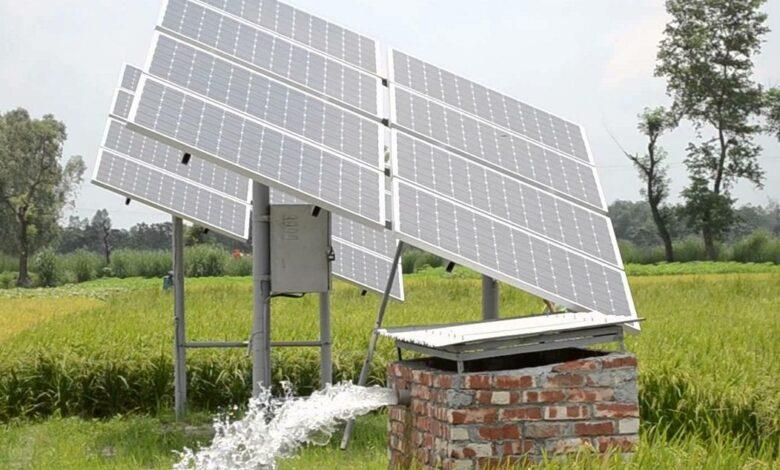
Solar Energy's Unintended Impact: Peshawar's Silent Drought Crisis
Saeed Ikram, a farmer in the Mathra region of Peshawar, reflects on the changes brought about by solar panels powering tube wells.“I remember the frustration during load shedding when our tube wells would stop working, leaving our fields dry,” he begins.“But when solar panels came into the picture, it seemed like a solution to our problems. However, as time passed, I started noticing something troubling.”
“As our tube wells began running non-stop thanks to solar energy, it became apparent that we were extracting more water than necessary,” Saeed explains.“The continuous pumping has led to a significant drop in groundwater levels, and I fear we're heading towards a silent drought.”
Extending Pumping Hours
According to Amjad Khan, Sub-Divisional Officer (SDO) of Peshawar Irrigation Department, there are over 200 solar panel tube wells installed in various areas of Peshawar. These tube wells operate from 7 am, when the sun rises, until 5 pm, when the sun sets, effectively running for 12 hours each day.
Also Read: Preserving Mother Languages: A Call for Educational Embrace in Pakistan
This extended operation period contrasts starkly with the previous situation, as shared by residents of suburban areas of Peshawar. They report that before the adoption of solar systems, tube wells would only run for 7 hours a day due to extensive load-shedding periods lasting 16 to 17 hours during the summer months.
This shift to solar-powered tube wells has significantly increased the pumping duration, exacerbating water wastage and contributing to the silent drought gripping the region.
Population Growth & Challenge
As the population of Peshawar undergoes a remarkable surge from 2.1 million in 1998 to 4.269 million in 2017, with projections anticipating a rise to 6.2 million by 2030, the strain on water resources becomes increasingly apparent.
This data, sourced from the Pakistan Bureau of Statistics (PBS), highlights the significant demographic shifts within the district. Tube wells traditionally relied upon as the primary water source, are now faced with unprecedented challenges exacerbated by rapid population growth.
In response to electricity shortages, many tube wells have transitioned to solar panels for power, allowing for continuous operation. However, this shift has inadvertently led to excessive water wastage, as the tube wells run incessantly. The data gathered from the Water and Sanitation Services Peshawar (WSSP), reveals that out of the multitude of tube wells currently in operation, only one in 13 effectively meets the water needs of the burgeoning population.
This imbalance in water supply and demand exacerbates the existing water scarcity and accessibility issues prevalent in Peshawar. Despite efforts to address the situation, as documented by the Public Health Engineering Department (PHED), the challenges persist, necessitating urgent action to ensure sustainable water management practices and secure the future of Peshawar's water resources amidst its rapidly growing population.
Water Conservation Initiative
In response to the worsening water crisis in Peshawar, the Water and Sanitation Services Peshawar (WSSP) has taken decisive action. Recognizing the urgent need for conservation, WSSP has mandated that solar-powered tube wells operate for only four hours a day. According to their latest announcement, tube wells will run from 6 am to 8 am and from 3 pm to 5 pm.
This initiative aims to optimize water usage while addressing the challenges posed by energy scarcity. However, the public's frustration with unreliable load shedding continues, prompting questions about the accountability of government officials responsible for managing energy resources.
Call for Action from Climate Dialogue Peshawar
Voicing his concerns, Shahabuddin, the Founder of Climate Dialogue Peshawar, underscores the escalating water crisis in Peshawar, emphasizing the critical need for immediate action. He said,“I am deeply concerned about the excessive usage and wastage of water in our city. It's alarming how we continue to extract water from the ground without allowing it to recharge, resulting in a significant decrease in underground water levels-a matter of grave significance.”
Shahabuddin's organization has launched an extensive awareness campaign targeting students across educational institutions. He said,“The aim is to equip the youth with the knowledge and tools to combat water wastage effectively. I envision a future where these informed individuals will champion the cause of water conservation within their generation and beyond.”
Additionally, Shahabuddin underscores the need for widespread awareness about the importance of water conservation. His research highlights car wash stations as major contributors to water wastage, prompting him to advocate for comprehensive recycling efforts for both commercial and domestic water usage.

Legal Disclaimer:
MENAFN provides the
information “as is” without warranty of any kind. We do not accept
any responsibility or liability for the accuracy, content, images,
videos, licenses, completeness, legality, or reliability of the information
contained in this article. If you have any complaints or copyright
issues related to this article, kindly contact the provider above.


















Comments
No comment